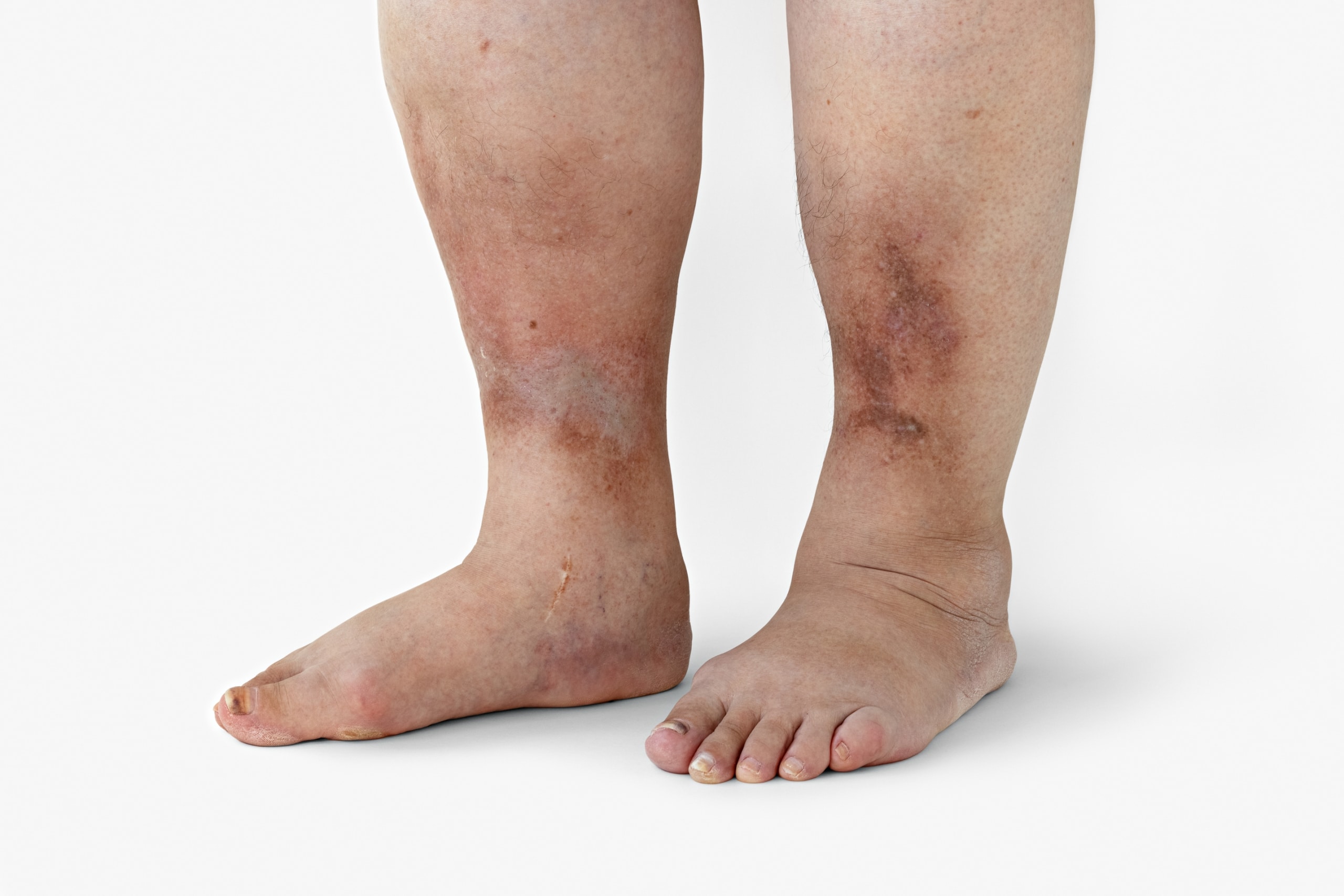What do diabetic legs look like?

How do you know if you have diabetes in your legs
Tingling, burning, or pain in your feet. Loss of sense of touch or ability to feel heat or cold very well. A change in the shape of your feet over time. Loss of hair on your toes, feet, and lower legs.
What does diabetes in the legs look like
Diabetic dermopathy
This condition is also known as shin spots, and it's harmless. The spots look like red or brown round patches or lines in the skin and are common in people with diabetes. They appear on the front of your legs (your shins) and are often confused with age spots. The spots don't hurt, itch, or open up.
Cached
What are the beginning signs of type 2 diabetes legs
Peripheral neuropathyNumbness or reduced ability to feel pain or temperature changes.Tingling or burning feeling.Sharp pains or cramps.Muscle weakness.Extreme sensitivity to touch — for some people, even a bedsheet's weight can be painful.Serious foot problems, such as ulcers, infections, and bone and joint damage.
Cached
What do diabetes bruises look like
Diabetes-related dermopathy looks like small, round pink, reddish or brown patches on your skin. They can look like scars and be indented. They're generally 1 centimeter to 2.5 centimeters in size. The patches are harmless and don't itch, ooze liquid or cause pain.
Cached
How do you reverse diabetic legs
There is currently no way to reverse diabetic neuropathy, although scientists are working on future treatments. For now, the best approach is to manage blood sugar levels through medication and lifestyle changes. Keeping glucose within target levels can reduce the risk of developing neuropathy and its complications.
Where do you itch if you have diabetes
Itching. Localized itching is often caused by diabetes. It can be caused by a yeast infection, dry skin, or poor circulation. When poor circulation is the cause of itching, the itchiest areas may be the lower parts of the legs.
Can you reverse diabetes legs
Nerve damage from diabetes can't be reversed. This is because the body can't naturally repair nerve tissues that have been damaged.
What are the 3 most common symptoms of undiagnosed diabetes type 2
The main symptoms of type 2 diabetes are:urinating more often than usual, particularly at night.feeling very thirsty.feeling very tired.unexplained weight loss.itchiness around the genital area, or regular bouts of thrush (a yeast infection)cuts or wounds that heal slowly.
What are the 3 most common symptoms of undiagnosed diabetes
Feeling very thirsty. Feeling very hungry—even though you are eating. Extreme fatigue. Blurry vision.
What is diabetic belly
It can be an early sign of so-called "diabetic belly," a build-up of visceral fat in your abdomen which may be a symptom of type 2 diabetes and can increase your chances of developing other serious medical conditions.
What does pre diabetic skin look like
Darker area of skin that feels like velvet
A dark patch (or band) of velvety skin on the back of your neck, armpit, groin, or elsewhere could mean that you have too much insulin in your blood. This is often a sign of prediabetes. The medical name for this skin condition is acanthosis nigricans.
Is walking good for diabetic legs
you can walk anywhere, any time and it's free. briskly walking can help you build stamina, burn excess calories and make your heart healthier. it can help the body to use insulin more effectively. it is easy on your joints.
What is good for diabetic legs
Exercise. Getting regular, moderate exercise has a range of health benefits, such as improved blood flow. Improved blood flow helps bring oxygen and nutrients to the legs. People with diabetic peripheral neuropathy may experience a reduction in their symptoms if they increase their level of physical activity.
How do you feel when your blood sugar is too high
feeling or being sick. abdominal (tummy) pain. rapid, deep breathing. signs of dehydration, such as a headache, dry skin and a weak, rapid heartbeat.
How do you get rid of diabetic legs
Here are nine tips to help manage and relieve diabetic leg pain.Use exercise to promote overall health.Eat a diabetic-friendly diet.Manage weight.Maintain appropriate blood sugar levels.Practice daily foot and leg care.Build healthier habits for compounded prevention.Try physical therapy.
What are the red flags for type 2 diabetes
Check if you have type 2 diabetes
peeing more than usual, particularly at night. feeling thirsty all the time. feeling very tired. losing weight without trying to.
How many years can you have diabetes without knowing
Many people have type 2 diabetes for years without realising because the early symptoms tend to be general, or there are no symptoms at all.
What is the number 1 symptom of diabetes
The main symptoms of diabetes are: feeling very thirsty. urinating more frequently than usual, particularly at night. feeling very tired.
What color is your urine when you have diabetes
Transparent and lacking in color
Transparent, colorless urine could also be a sign of some other health disorders, including diabetes and kidney disease, or from taking diuretic medication.
What are the big 3 signs of diabetes
Simply defined, the three P's are:polydipsia: an increase in thirst.polyuria: frequent urination.polyphagia: a rise in appetite.
Why do diabetics get big stomachs
Especially if you have been diagnosed with type 2 diabetes, diabetic belly or excessive abdominal weight gain is a sign that your body is building up too much visceral fat, which is a sign of more serious underlying issues which can lead to other health problems down the line.
Does drinking water lower blood sugar
Drink plenty of water
Drinking plenty of water helps your kidneys flush out excess sugar. One study found that people who drink more water lower their risk for developing high blood sugar levels. And remember, water is the best. Sugary drinks elevate blood sugar by raising it even more.
What exercise lowers blood sugar the fastest
Here are 10 ideas to help you get started:Walking. Walking is a low-impact activity that many people enjoy.Running.Cycling.Dancing.Water aerobics.High intensity interval training.Weight training.Yoga.
What are 3 things you should never do to the feet of someone with diabetes
Avoid soaking your feet, as this can lead to dry skin. Dry your feet gently, especially between the toes. Moisturize your feet and ankles with lotion or petroleum jelly. Do not put oils or creams between your toes — the extra moisture can lead to infection.
How can diabetics improve circulation in legs
How to improve blood circulation if you have type 2 diabetesThe link between diabetes and poor circulation.How to improve your circulation.Take quick, frequent exercise breaks.Exercise to benefit problem areas.Eat for heart health.Wear diabetic socks.Maintain low blood sugar.Stop smoking.



0 Comments